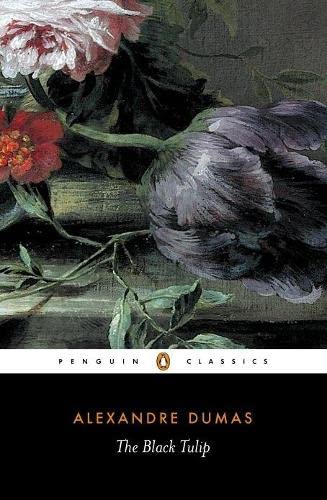Genre
Audience
Author’s Worldview
1800s France; Catholic, atheist & republican cultural backgrounds.
Year Published
1850
Themes
Reviewed by
Corinna Turner
Would you die for a flower? Would you kill for one? God’s Providence is the only hope for the protagonists in this tense, heart-warming prison romance.
“To despise flowers is to offend God,
The more beautiful the flower is, the more does one offend God in despising it,
The tulip is the most beautiful of all flowers,
Therefore, he who despises the tulip offends God beyond measure.”
Such is the philosophy of the main protagonist of The Black Tulip, the young man Cornelius Van Baerle, a noble merchant living in his home town of Dort in the Netherlands in 1672. Gentle, kind, generous, and intelligent, he lives a quiet, comfortable life devoted to his passion of tulip growing—a common hobby at the time. The Dutch tulip society has offered a grand prize of one hundred thousand florins for the person who can breed a completely black strain of tulip and Cornelius has finally produced three bulbs he is certain will achieve this.
Unfortunately, Cornelius’s once-powerful godfather and his godfather’s brother, rulers of the Netherlands at the time, have fallen out of favor with the people. This affords Cornelius’s jealous neighbor the opportunity he has been looking for. Cornelius, though innocent, is accused of treason and arrested. But to his neighbor’s dismay, Cornelius manages to take the bulbs with him to prison, where they—and his blooming relationship with his jailor’s daughter, Rosa—are his only consolation.
Can Cornelius grow the black tulip, prove his innocence and win the affections of the woman he loves? This unusually short novel by Alexandre Dumas is a heartwarming parable about goodness, faithfulness, and the power of Providence.
The Black Tulip has all the adventure, suspense, and romance one would expect from a Dumas’ novel, but combines these qualities with an almost impeccable moral tone that is rare, if not unique, in Dumas’s work (where protagonists usually engage in casual adultery as easily as in swash-buckling heroics). As such, it is a rare gem, a Dumas’ novel that a reader with traditional moral standards can enjoy and re-read unreservedly.
Providence and faithfulness are major themes, the idea that the good must hold to what is good no matter what and let the chips fall as they may. Cornelius is a fantastic example of this attitude. However, he remains a very human character, fallible and with his flaws. He and Rosa must learn to try to improve themselves where they can, but ultimately to accept each other, flaws and all—a vital lesson for any prospective spouses!
The romantic relationship is particularly satisfying, perhaps especially for a modern reader, since it is between two people from—in worldly terms—impossibly different backgrounds. Rosa, as a jailor’s daughter, is the lowest of the low, while Cornelius is of the noble merchant class and connected to the country’s rulers. This presents another test of the protagonists’ true natures.
Cornelius and Rosa’s faith in God is very clear and explicit throughout the book, however the visible aspects of Calvinism (the religion of the Netherlands at the time) are very limited—at a key moment Cornelius even refuses a visit from a clergyman on the grounds that he has worshipped God his whole life and feels God can ‘have nothing against me.’ This blasé attitude may well make Catholic readers wince, but it is clear that Dumas is using his protagonists’ faith to make a more satisfying story. He is not writing with any sort of didactic or theological intent.
It’s important to note that Dumas wrote historical fiction, not history. He presents historical events according to his own bias (committed republican) and, above all, for maximum dramatic effect. While what happened to Cornelius’s godfather and godfather’s brother is generally accepted as a low point in Dutch history, it is unlikely things were quite as black and white politically as Dumas presents them.
As a classic novel rather than a specifically religious work of fiction, this would be good for any reader, whether secular, Protestant, or Catholic, so long as they are happy to read about characters who trust in God.
The first four chapters of this novel contain two particularly brutal murders and when considering this book for younger readers it would be advised that parents, caregivers, and teachers pre-read these chapters to make sure they think the book suitable for the child in question.
When considering this book for younger readers, people should also be aware that many of Dumas’ other works contain very casual—and very normalized—portrayals of immoral behavior, and that Dumas himself was a notorious womanizer with forty mistresses and at least four illegitimate children.
However, this particular novel is a tense, heart-warming prison romance with a strong theme of God’s Providence triumphing over evil that will leave most readers feeling warm and satisfied.



